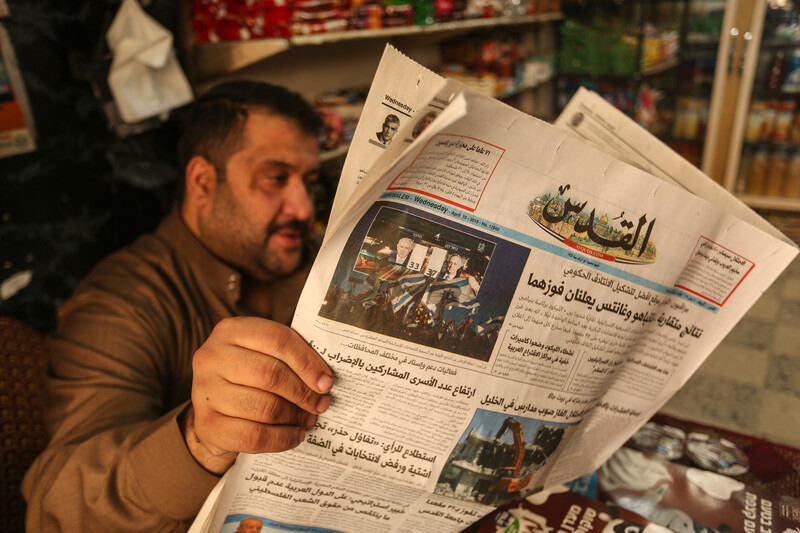Power Suits 12 April 2019

A man in Khan Younis, Gaza, reads up on Israeli election news. Palestinian leaders of different stripes have dismissed Tuesday’s vote as irrelevant or a “yes to occupation.”
ZUMA Press/NewscomThat was that then.
An Israeli election that promised zero change, yet was avidly followed around the world, ended with zero change.
Meet the new boss, same as the old boss.
Benjamin Netanyahu, the incumbent, is now a shoo-in to form the next government, one that will be as rightwing as the last government.
It would have made very little difference had his main challenger, Benny Gantz, been in a position to take over.
Spot the difference:
In the blue corner was what is likely to become the longest-sitting Israeli prime minister, who last year tweeted: “The weak crumble, are slaughtered and are erased from history.”
In the white corner was Gantz, former army chief of staff, who boasted of overseeing Israel’s hi-tech slaughter in Gaza in 2014 and ran on the slogan “Only the Strong Win.”And these were some of the milder statements from those running for office or who have recently served in the highest of official positions in Israel. A handy collection can be found here.
But a disturbing supremacist theme runs through them all. It is worth remembering that dehumanizing language is used ahead of most genocides. Nazis depicted Jews as rats. Hutus called Tutsis “cockroaches” before the Rwandan genocide.
In Israel, Palestinians are “beasts” or “snakes.”
So that bodes well.
Promises, promises
The election campaign saw almost no attention paid to the five million or so Palestinians who live under Israeli military rule in the occupied West Bank and Gaza.
That changed suddenly on the last day of campaigning when, possibly concerned by polls that showed him running neck-and-neck with Gantz, Netanyahu promised the Israeli electorate that if re-elected he would annex more Israeli settlements in occupied territory.
Israel has of course already annexed Jerusalem. It has annexed the Golan Heights. It has, for all intents and purposes, long ago annexed the Jordan Valley.
And since settlers in settlements that are off-limits to Palestinians in the occupied West Bank in any case already live under civilian Israeli law – as opposed to the aforementioned military law the Palestinians around them live under – these colonies too are in all but word already annexed.
Nevertheless, any attempt at official annexation will likely be rejected by the large majority of the world community, except in the US, where President Tweetle Trump and his intrepid trio of tireless peacemakers will no doubt welcome it with a glass of Golan’s finest.
Indeed, on Tuesday, Trump’s Secretary of State, Mike Pompeo, was unable to tell the US Congress whether the administration would recognize any Israeli annexation of more settlements.He was also unable to say why Russia’s annexation of Crimea was bad, but Israel’s annexation of the Golan was good, referring to some “international law doctrine” that simply does not exist.
International opprobrium of Israel, however, will be as tepid as ever – the diplomatic equivalent of being frowned upon in polite company – and will do precisely nothing to change anything on the ground.
It is a well-established historical fact that colonizers and occupiers do not cease and desist because they’ve learned the error of their ways.
They do so after a long campaign, either indigenous or international and usually both, to flip the cost-benefit ratio of their activities.
See India. See Algeria. See everywhere else.
The Apartheid regime in South Africa did not suddenly wake up and see the light, or dismantle the country’s racist legal system because no one would talk to its officials at cocktail parties.
It did so after a sustained indigenous insurrection and a long international grassroots campaign, culminating in South Africa’s international isolation, a boycott of its products and sanctions against those who still did business there.
Israel is no exception to this rule. Why would it be?
Palestine disunited
Palestinians remain divided in their separate pockets.
Those with Israeli passports hardly bothered to vote. The turnout was just over 50 percent, a historic low and one a PR company attributed to its own campaign of placing cameras at polling stations to deter voters.
A simpler explanation would be that, in a country that enshrines a constitutional difference between the rights of one set of people over another – defining the right to self-determination in Israel as “unique to the Jewish people” – there is simply little incentive for non-Jews to vote.
The Palestinian Authority, meanwhile, announced that the election was a vote “to preserve the status quo. [Israelis] have said no to peace and yes to the occupation,” in the words of chief negotiator Saeb Erekat, begging the question that if that was this vote, what were the last four that Netanyahu also won?
The PA remains chained to the two-state “vision,” though even here, a soft breeze of change seems to be gently disturbing the cobwebs.
PA leader Mahmoud Abbas in 2017 told the UN that if the two-state solution should be destroyed due to the “creation of a one-state reality with two systems,” then Palestinians will have no “other choice but to continue the struggle and demand full, equal rights for all inhabitants of historic Palestine.”
The PA has rejected US mediation ever since Trump announced that he would move the US embassy in Israel to Jerusalem and has long urged a boycott of businesses operating in settlements.
Nevertheless, the PA has held back from calling for a full boycott of Israel and has not pinpointed what exactly would constitute a “one-state reality.”
The annexation, with US support, of Area C of the West Bank, the 60 percent of the land that is under full military and administrative Israeli control and which contain all settlements, might be that moment.
Another might be the eagerly unanticipated US administration’s peace plan, about which rumors abound.
Some suggestions have the US offering Palestinians a Greater Gaza, extended into Egypt’s Sinai desert and billions in development aid (from Arab countries).
Maps even made it onto Twitter:
One suspects that the PA in the West Bank and Hamas in Gaza would agree, at least, on their response to such a plan.Perhaps they need to focus on other lowest common denominators besides their estimation of US diplomacy.
Like their assessment of Israel’s elections, met with a shrug in Gaza.
“Irrelevant,” said senior Hamas official Khalil al-Hayya. “All parties are faces of the same coin, the coin of occupation.”





Comments
Greater Gaza map? Translation please?
Permalink Greater Gaza map? Translation please? replied on
Please could you have an English translation of the Arabic ( I presume?) "Greater Gaza map" shown at the end of this article? Looks a very odd shape too do you have any ideas why it would look that way & what its including & excluding?
Occurs to me that Gaza could be handed over to Egypt - think that's likely? They did run it from 1948 to 1967 after all although whether Egypt or Hamas would want that I rather doubt. Still.
Good article / essay / post BTW, thanks.